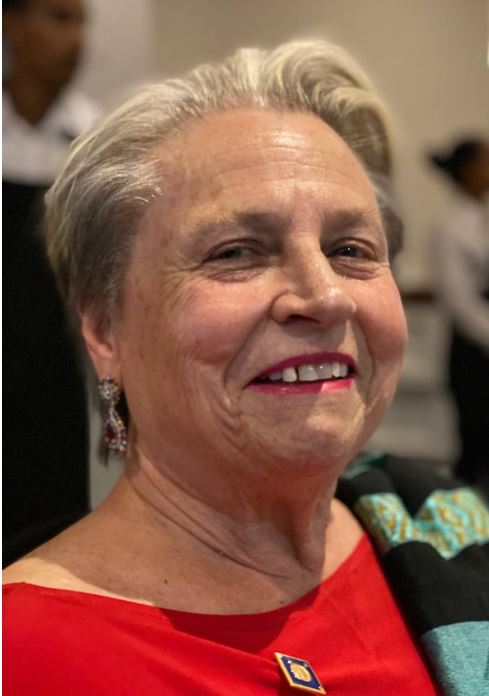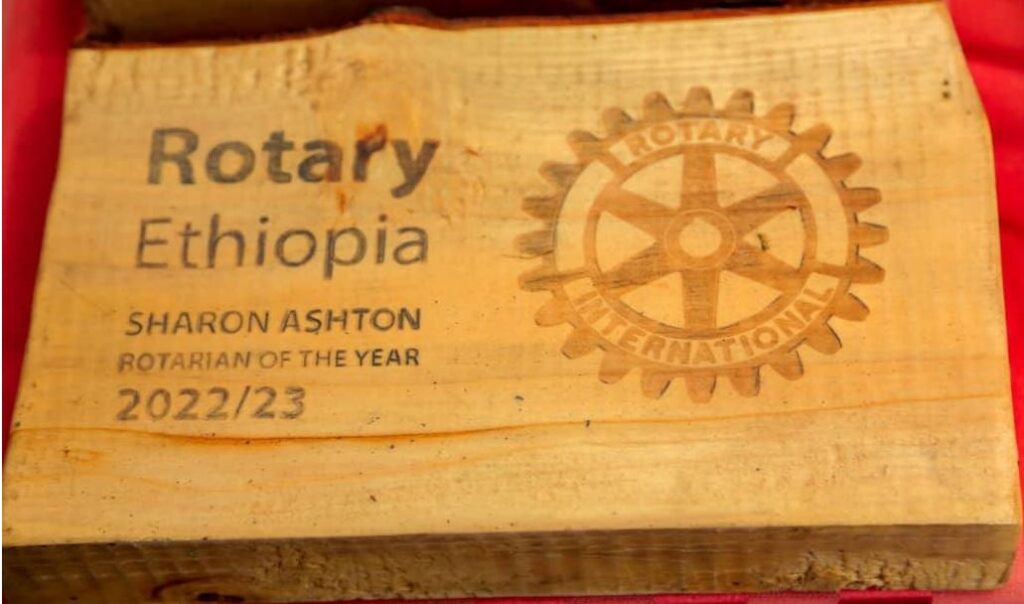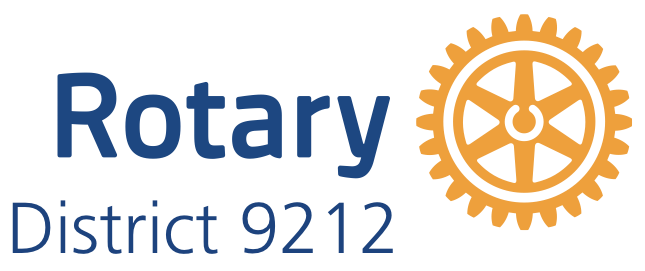Meet Rotary Ethiopia’s `Project Guru’
By Hanna Abebe
We are thrilled to introduce you to the remarkable Rotarian Sharon Ashton, a shining star among Rotarians in Ethiopia. As a past president of the Rotary Club of Addis Ababa West, Sharon exemplifies the spirit of service and dedication that defines our organization.
She is not only a Paul Harris Fellow but also a benefactor and major donor, whose passion for impactful projects has earned her the esteemed title of Project Guru. In recognition of her outstanding contributions, she was honored with the 2022/2023 Rotary Ethiopia Rotarian of the Year Award.
When Rotarian Sharon joined Rotary, she brought her exp
ertise in finance to our vibrant community in Addis Ababa. Her journey is a testament to the power of commitment and the profound impact one individual can have on the lives of many.
Thank you, Rotarian Sharon, for your willingness to share your inspiring story with us. Your dedication fuels our collective mission and inspires us all to serve with purpose and passion. Can you share your journey with Rotary and what initially inspired you to join and what kept you going?
I joined Rotary in 2013, shortly after opening a specialized ophthalmology hospital in Addis Ababa. I was drawn to Rotary as a way to connect with like-minded professionals committed to service, integrity, kindness and adventure.
I’ve stayed in Rotary because it provides a platform to envision and implement projects that make a real, tangible impact—on both local and national scales. Being part of these efforts and working alongside passionate humanitarians from around the world has allowed me to contribute meaningfully while also experiencing significant personal growth.
What is Rotary to you?
Rotary connects me to something greater than myself. It enables me to serve beyond my own personal or professional sphere, all the while staying engaged with the evolving needs of the world.
Which projects have you implemented?
2015 Sister Tibebe’s training and education project
2017 Promoting gender parity in basic literacy for Ethiopian children
2017 Preventing and Treating Neural Tube Defects in Ethiopia
2018 Clean Drinking Water and Sanitation for Schools in Addis Ababa
2020 COVID-19 Emergency Response for Ethiopia
2021 Non-Rebreathing Oxygen Masks for MOH
2021 Enhancing the capacity of communities to build positive peace through communication
2021 Surgical Equipment for Delanta Hospital
2022 medical equipment for Kombolcha Hospital in Northern Ethiopia
2023 Disaster Response Grant – Multi-Purpose Cash Assistance (Food Basket only) Project for Populations Affected by drought in EL Ogaden woreda of Somali region
2023 Preventing spina bifida and anencephaly in high-risk pregnancies in Ethiopia
2024 RC AAW Trauma in Women with Usaid
2024 IOM and ShelterBox – Rotaractor-led relief program in the Afar region.
2024 Surgical equipment for St Luke Catholic Hospital in Wolisso Ethiopia
2024 St. Lukes Hospital Project II, Wolisso, Ethiopia
2025 Cardiac Mission to Black Lion
2025 Promoting Peace Through the Arts at Selamawi
In your experience, what are the key elements that contribute to the successful implementation of a Rotary project?
Successful Rotary projects rely on strong needs assessments, clear goals, effective leadership, teamwork, and genuine community involvement. These principles are essential for achieving lasting impact.
What are some common challenges you’ve faced in project implementation, and how have you overcome them?
Implementing projects in Ethiopia comes with its own set of systemic challenges. Bureaucracy at multiple levels—including The Rotary Foundation (TRF), the District, and Rotary Ethiopia (RE)—can be excessive and burdensome.
Additionally, navigating the Office of Foreign Assets Control (OFAC) applications, due to U.S. economic sanctions against Ethiopia, severely delays fund transfers and project execution. As volunteers, these administrative hurdles can be time-consuming and frustrating. Ethiopia’s market inefficiencies—currency volatility, inflation, and resource shortages—add further complexity. Another challenge is engaging Rotarians who are both willing and able to contribute their time and financial resources consistently.
To overcome these obstacles, strong leadership is essential. A project leader must be organized, strategic, and responsive. Most importantly, they must build and rely on a capable, proactive, and innovative team. A great team is the cornerstone of a successful project. Furthermore, efforts must be made by Rotary at all levels, to minimize bureaucracy, as volunteers often lack the time and patience to navigate endless back-and-forth and frustrating procedural hurdles.
What motivates you to stay in Rotary other than projects?
What keeps me inspired are the visionary Rotarians—locally and globally—whose dedication to humanitarian work is uplifting and energizing. Working with youth is especially fulfilling; their energy and spirit are contagious and keep us young at heart. I’m fortunate to collaborate with a few exceptional Rotarians in Addis whose passion and extraordinary vision make every project exciting and its impact magical.
Can you discuss the role of collaboration with local communities and other organizations in the success of your projects?
Strong communication, collaboration and action with local communities and partner organizations are the lifeblood of every Rotary project. These stakeholders share the responsibility for ensuring each initiative is implemented effectively, economically, and sustainably. Their unique perspective offers insight into the core of the project, often revealing the unseen needs that must be addressed.
Ultimately, the community must take ownership of the project’s outcomes to ensure lasting impact. What are your top three tips for Rotarians who are new to writing grant proposals?
1. Clearly define goals and objectives and prepare all required documentation such as MOUs
2. Assemble a dynamic, responsible project team.
3. Begin drafting the final project report on day one of implementation, ensuring to keep well organized files
Can you share a specific project that didn’t go as planned? What lessons did you learn from that experience?
One project that faced significant challenges was the Procurement of Medical Equipment and Pharmaceuticals for St. Luke’s Hospital in Wolisso. The objective was to replace outdated equipment and provide essential drugs and medical disposables. We were optimistic that this project could be completed quickly, as our team had recently implemented another project for the same hospital involving surgical instruments and an anesthesia machine.
Although we received grant approval from Rotary International and the District quickly, the project was delayed due to account-related issues and the lengthy OFAC approval process. Because of US sanctions against Ethiopia, every supplier must be pre-cleared by Rotary’s legal department, which can take weeks.
In this case, although we submitted applications early, funding delays forced us to repeat the process several times—an incredibly frustrating experience. Then, on July 29, 2024, the National Bank of Ethiopia revised its foreign exchange system, resulting in a 30% currency devaluation. This caused significant market instability, including inflation, resource shortages, and uncooperative suppliers. Many refused to honor their previous price quotes and even to supply the goods. With persistence and negotiation, we were able to resolve these issues amicably.
Lessons Learned?
Every detail matters—be precise and plan thoroughly.
Prioritize clear, transparent communication with all partners.
Be flexible, creative, and ready to adapt.
Always expect the unexpected, and act swiftly.
Be exceptionally grateful and humble to your amazing team
Your best wishes for Rotary?
As the world evolves, so too must Rotary. I hope the organization continues to adapt to changing global contexts and remains focused on broad, impactful humanitarian efforts—without narrowing its attention to only a few geopolitical crises. Rotary must go boldly forward —honoring its legacy while reimagining its role in a rapidly transforming, digitally connected, and AI-driven world.
Your message to the New Generation?
To the New Generation: You are the catalysts for real change. Stay focused on purpose, not politics or ego. Let the magic of Rotary dance in your heart, while your passion and innovation transform lives, one act of service at a time.



